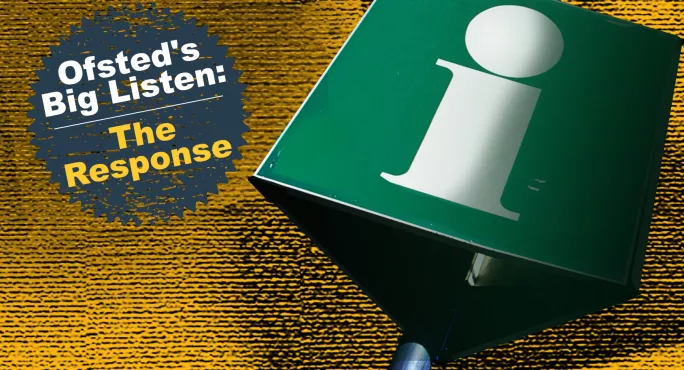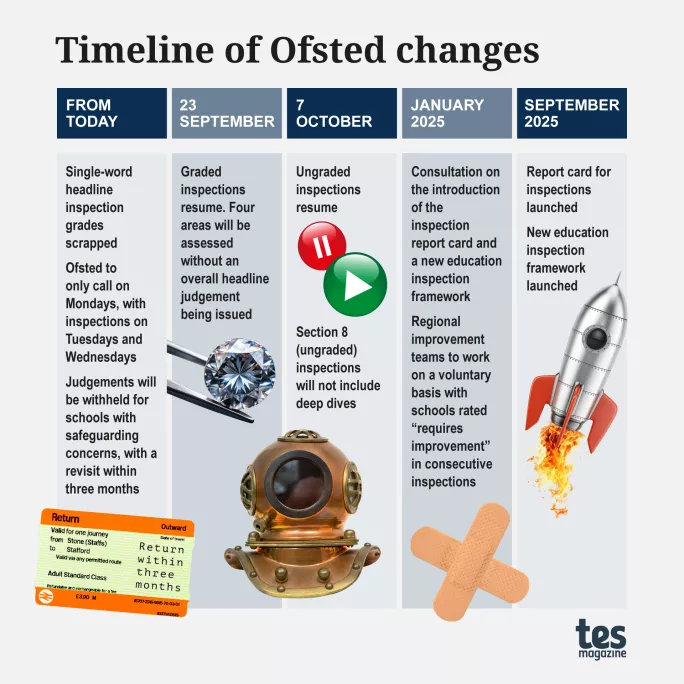Ofsted’s Big Listen response: all you need to know

Ofsted has announced a major overhaul of inspections in response to concerns raised in its Big Listen consultation.
This follows the government’s announcement yesterday that single-word overall inspection judgements for schools have been scrapped with immediate effect, to be replaced with report cards from next year.
Ofsted’s Big Listen consultation was launched earlier this year amid significant scrutiny following the death of headteacher Ruth Perry and an inquest ruling that an inspection had contributed to her death.
Ofsted has today released a summary of the consultation findings, alongside announcements of a series of changes.
The response has been released on the same day that Dame Christine Gilbert has published her independent review on Ofsted.
Ofsted announces big changes
Under the changes outlined today, Ofsted will still operate a system of ungraded and graded inspections for this academic year, with schools awarded grades for the four current sub-judgements - including on leadership and management and quality of education.
Graded inspections this academic year will resume from 23 September and ungraded inspections from 7 October. Next September a scorecard inspection report system is expected to be introduced.
The delay to the resumption of ungraded inspections is to allow time for training. From this academic year, ungraded inspections will no longer include subject deep dives.
Other plans include:
- Replacing single-word judgements with a report card
- Consulting on a new inspection framework
- Consulting on a new inspection criterion for inclusion
- Only contacting schools about inspection on a Monday
- Pausing publication of reports over safeguarding

Replacing single-word judgements with a report card
In the Big Listen consultation, just 10 per cent of schools that responded and less than half of parents said they supported single-word judgements.
The Department for Education announced yesterday that single-word overall judgements of schools are being scrapped with immediate effect.
Ofsted said today that a report-card system would be introduced for all areas Ofsted inspects. It said this system would “provide a more nuanced and detailed assessment of providers’ work”.
Report cards will be introduced from September 2025. An informal consultation will be held this term, before a formal consultation in the new year, setting out proposals for the report card.
In the summer term, Ofsted will move to piloting the new inspections and delivering training. It has said that criteria in the new report card will include safeguarding and inclusion.
It is not yet clear whether Ofsted or the Department for Education will be leading the consultation.

- Ofsted target drove down quality of inspections
- Sir Martyn Oliver: ‘We accept the criticism’
- DfE scraps Ofsted single-word school inspection grades
New inspection framework
Ofsted is also creating a new framework to support changes to inspections, to help inform the new report card.
The current education inspection framework, launched in 2019, will continue to be used for this academic year but without the awarding of overall inspection grades.
The new framework will be launched next September. Ofsted is expected to begin pilot inspections of the framework in the summer term of 2024-25.
Speaking at a press conference to announce the changes, Ofsted chief inspector Sir Martyn Oliver told Tes that he wanted the new framework to focus on “rising standards but also to particularly highlight the most vulnerable children and children with special educational needs”.
New focus on inclusion
Ofsted has also announced that it will consult on introducing a new inspection criterion for inclusion as part of its changes.
The watchdog said this will increase its focus on, and scrutiny of, how schools support vulnerable children and young people, such as those who are disadvantaged or who have special educational needs and disabilities.
As part of this, it is expected that inspectors could scrutinise how schools are using pupil premium to support pupils from disadvantaged backgrounds.
Schools only contacted on a Monday
Ofsted will announce all routine inspections on a Monday, with inspections taking place over the following two days. Ofsted inspectors will be expected to write reports on Thursdays, and then Fridays will be used for national training days and “national consistency panels”.
The inspectorate said this will mean school leaders will know by a Monday afternoon if they are being inspected that week. It said this measure would help to reduce the stress of waiting. The new approach will be piloted over the autumn term.
Ofsted has previously attempted to give schools an indication of when they might be inspected based on their current grade and when they were last inspected.
Pausing inspection reports over safeguarding
Ofsted is going ahead with a plan to pause the publication of inspection reports when safeguarding concerns are identified in an otherwise high-performing school. Inspectors will revisit the school within three months, to give it time to remedy issues without intervention from the DfE.
Parents will still be informed about safeguarding issues in the meantime. This change will come into effect from this month. It follows concerns over the way in which Ms Perry’s school was downgraded from “outstanding” to “inadequate” over safeguarding concerns.
If, at the end of this process, a school is found to still have ineffective safeguarding, its leadership and management will be rated “inadequate”, which could trigger government intervention.
Increased focus on attendance
Sir Martyn said that, “at some point”, Ofsted will work with the DfE to ensure that government plans for annual safeguarding attendance and off-rolling reviews will sit alongside the new inspection framework.
He told a press conference that he also wanted to ensure that Ofsted is looking at issues the sector is facing right now.
“We know that attendance is a national issue, so I think attendance should be pulled out and focused on separately,” he said.
Ruth Perry’s death ‘a catalyst for change’
Sir Martyn said that Ms Perry’s death had been a catalyst for inspection change but added that “the case for change has been building for years”.
“We recognise the growing challenges facing education and social care, particularly since the pandemic. We don’t want to add to this pressure,” he said.
“Many of the changes we are introducing are aimed at reducing the pressure on those we inspect. We will always strive for higher standards for children, particularly the most vulnerable children.”
Sir Martyn said he supported the government’s plan to replace single-word inspection grades and believed it could provide parents with more nuanced information about a school.
SEND area inspections being reviewed
Ofsted has said it will review its system of SEND area inspections, undertaken with the Care Quality Commission (CQC), which was only introduced last year.
The inspectorate will not be carrying out return monitoring inspections to areas where concerns have been identified until this review is carried out.
Under its current SEND area inspection framework, Ofsted and the CQC had planned to carry out monitoring inspections in areas where widespread or systemic failings have been found. These were scheduled to take place 18 months after the initial inspection.
Responding to feedback in the Big Listen, Ofsted said that some respondents “want us to stop inspecting special educational needs and disabilities (SEND) services across a local area. They argue that the system of SEND provision is too broken for us to hold providers and services to account fairly”.
The watchdog has also said it will publish a summary report for the government, “setting out the national and systemic issues we are seeing” on SEND and alternative provision.
Support for Ofsted inspectors
Ofsted has also launched its Ofsted Academy, which it said will be a “single place that draws together...induction, training, learning, development and good practice work”.
It said that the mental health training delivered to inspectors earlier this year now forms part of its regular core training for all inspectors.
And it is to set up an inspection welfare, support and guidance hub to make sure inspectors and providers have access to supportive information, and to offer any other assistance during inspection.
Ofsted said it would improve its investigations into complaints. For example, inspectors assessing complaints will always be from a different region to the one where the complaint originated.
Pulling together area-wide data
Ofsted will be developing an “area insights service”. The idea, in which Sir Martyn expressed interest during an appearance before the Commons Education Select Committee, will involve Ofsted’s oversight of local data being used to “illustrate what it is like to be a child in any given area”.
Ofsted said this will provide better information for parents and carers about the education and social care systems their child moves through from birth to adulthood.

You need a Tes subscription to read this article
Subscribe now to read this article and get other subscriber-only content:
- Unlimited access to all Tes magazine content
- Exclusive subscriber-only stories
- Award-winning email newsletters
Already a subscriber? Log in
You need a subscription to read this article
Subscribe now to read this article and get other subscriber-only content, including:
- Unlimited access to all Tes magazine content
- Exclusive subscriber-only stories
- Award-winning email newsletters
topics in this article



